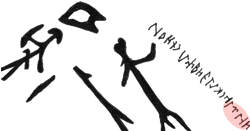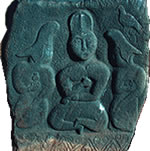|
|
| Social names |
 |
|
| tyri [teηiri] Sky
Kisi [kisi] man
jir [yer] earth |
According to old Turk conception: “1. Sky 2. Man 3. Earth” ‘s the first dominant edge. Sky – substantial notion. It isn’t a fetishism, mythological, godish notion. Turks comprehend “Тәңірі” as “sky space, world above us, round, light, upper dome”. In a word “Тәңірі” means “blue sky, space opposed to the Earth”. In the picture one can see the image in Dal uul rock. The inscription by the picture begins with the word “Тәңірі”.
The word is in the word combinations as “көк Тәңірі (the heavens), Тәңірі күш бергені үшін (thanks to heaven’s giving power), Тәңірі білге (the heaven is wise), Тәңірі қан (the heven is blood), Тәңірі жарылқадық (the heavens blessed), Түрік Тәңірісі (Turkic heaven), Тәңірі төбесінде (the heavens above).
|
 turq [türik] turk.
turq [türik] turk.
Turkish State’s people. In Altyn Tamgan Tarhan memorial’s first stele’s (A1) south side three men are sculptured wearing fur caps, holding cups, sitting on the ornamented felt mat. The man in the centre, is sitting on his crossed legs, his left hand touching his belt (his older brother and younger brothers are Turks). On the hat of the man on the left is the image of a bird and mark of Ashyna tribe.
|
This word is given in the phrase Turkic people in many memorials. Sometimes it is given as turK or turX.
|
| QGN [qaγan] kagan |
The top power rank’s name of the nomads. It means “the king of kings”, the leader of the big communities, beginning from small up to big tribes. In the old Turkic language it developed in the following way: * qan +*qan > qanqan > qaŋgan > qaγan
QGNG [qaγanïγ] – to kagan, QGNLG [qaγanlïγ]– қағандық (kingdom). There are the words Білікті қаған (wise kagan), жабайы қаған (savage qayan), as well as: Қырғыз қаған (Kirgiz kagan), Bilge kagan, Bumyn kagan.
|
| YDpiT [šad apït] shad-apyt |
| JBGU YD [Jabγu : Šad] yabgu, shad |
The power after kagan was exercised by “yabgu” and then “shad”.
|
| BUDN [büdïn] people (бүтін, халық) |
BUDNG[büdïnïγ] to the people (бүтінге), BUDNi [büdïnï] people (бүтіні).
It is used in the people’s name Turkic people (Түрік бүтін), Kirgiz people (Қырғыз бүтін), Tabgach people (Табғач бүтін), Turgesh people (Түргеш бүтін).
|
| l [el] ел |
1) People, public, community; 2) Native land, environment; 3) Background, origin, tribe.
lya [eliηe] to one's people (еліңе), turXli [turik eli] Turkish people /state (Түрік елі)
The old, wise people find the way easily. Asking “what is your origin? Or what tribe? Whose son are you? They enquire after your family everything and the word is used in the words El Etmish (Ел етміш), El Bilge (Ел білге).
|
| KuK [kök] blue (көк) |
1) Blue color. 2) Sky. 3) Above, high.
We come across with this words in the words God of the heavens (көк тәңірі), the heavens blessed (көк тәңірі жарылқады), high ranked Turk (көк түрік).
|
|
|
|
|
The basic idea of creating the electronic historical and cultural fund was based on issue of The Oriental Studies Section of The Institute of Oriental Studies named after Suleimenov in 2005 under the govermental program "Cultural Heritage":
"Қазақстан тарихы туралы түркі деректемелері" сериясының 2-томы
Н.Базылхан "Көне түрік бітіктастары мен ескерткіштері (Орхон, Енисей, Талас)"
Алматы: Дайк-Пресс. 2005, 252 б. +144 бет жапсырма.
Chief Editors:
doctor of history sciences Prof. M.Abuseitova
doctor of philology sciences Prof. B.Bukhatuly.
We appreciate The Director of The Institute of Oriental Studies Meruert Abuseitova for her help.
|
|









 turq [türik] turk.
turq [türik] turk.
